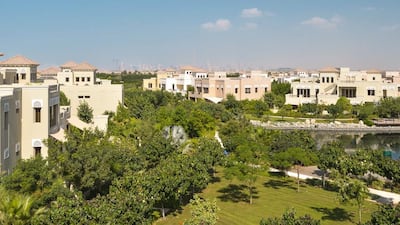DUBAI // With its lush green gardens, tree-lined pathways and 16 kilometres of waterways, Al Barari is a sharp contrast to the desert and scrubland that surrounds it – but all that comes at a high cost in water.
The 14.2 million square foot estate, made up of luxury villas, a restaurant and plant nursery just off Sheikh Mohammed bin Zayed Road, is the brainchild of the Zaal family.
With green spaces covering about 80 per cent of the area, demand for water is 30,000 cubic metres per day – more than an Olympic-size swimming pool – especially in summer.
However, Kamelia Zaal, creative director at Al Barari , said the team behind the project was conscious of its water footprint.
“We design our landscapes to be 50/50,” she said. “We have a balance of plants that are lower water consuming, with obviously some that are not, because – for aesthetic reasons – we would like more lush plants.
“We know what works and what does not, and what can still look good and thrive on a little bit less water here,” she said, explaining that when work on the development started, about 1,800 plant varieties were tested. Of them, about 700 proved suitable for use.
Irrigation is done via a more efficient drip system, and to be able to adjust to the plants’ needs in real time the development has a weather station that gathers data on temperature, humidity, sunlight and wind, said Bruce Pedersen, nursery production manager and technical assistant at Green Works, Al Barari’s nursery business.
Most importantly, Al Barari uses treated sewage effluent for irrigation, which it receives through a link with the nearby sewage treatment plant in Al Aweer. The water goes through an additional filtering process before it is used for irrigation and in the water features.
Mr Pedersen said it was better to use the nutrient-rich treated water for irrigation rather than discharging it in the Gulf, which could encourage harmful algal blooms.
“If the treated sewage effluent is not used, what happens to it?” Mr Pedersen said.
He said if it was not used for irrigation by Dubai Municipality or different developers, or for industrial use it would be discharged into Dubai Creek.
“The two issues need to be looked at in unison,” he said.
For phase two of Al Barari, the team is aiming to “produce a lush landscape but reduce the consumption of water”.
“We need to be able to keep our lush landscape but be sensible about it, be practical about it and be aware of the amount of water we are consuming, the types of plants we are using,” said Ms Zaal.
She tries to lead clients to a more sustainable approach in projects, by reducing water consumption in design.
“It would make sense for us to try and find the balance as quickly as possible for the sake of our people and our country.”
vtodorova@thenational.ae

